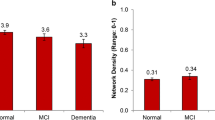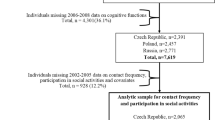Abstract
Background
This study aimed to investigate the longitudinal associations between social network (SN) and the risk of lower cognitive function, mild cognitive impairment (MCI), and dementia among cognitively normal individuals 65 years and older.
Methods
Data from the Age, Gene/Environment Susceptibility (AGES) Reykjavik Study on 2816 participants (aged 65 to 96 years) were used to examine the associations using multiple logistic and linear regression models. SN included questions on frequency of contact with family and friends as well as information on marital status, resulting in a score ranging from 0 (poor social network) to 3 (good social network). Cognitive function outcomes included the speed of processing (SP), executive function (EF) and memory function (MF). MCI and dementia were diagnosed using a detailed assessment according to international guidelines.
Results
At baseline 0.5, 7.0, 41.7 and 50.8% reported a score of 0, 1, 2 and 3, respectively. During a mean follow-up time of 5.2 years, 7.1% (n = 188) of cognitively intact participants developed MCI and 3.0% (n = 79) developed dementia. Longitudinal analyses demonstrated that participants who had low SN were significantly more likely to have declines in MF (β = − 0.533, P = 0.014) compared to high SN. Social networks were not independently associated with the decline of SP and EF during follow-up. According to fully adjusted models using logistic regression, SN was significantly associated with incidence risk of MCI (OR = 2.030, P = 0.014 and OR = 1.847 P = 0.001). These associations were largely independent of other lifestyle factors, depression and genetic disposition.
Conclusions
Community-dwelling older adults who have poor social networks have a higher risk of declining memory function as well as a higher risk of mild cognitive impairment than older adults who have a higher social network. This study included numbers of relevant covariates in the study analysis, thereby significantly contributing to the literature on cognitive aging.
Similar content being viewed by others
Data availability
The datasets generated during and/or analysed during the current study are available from the corresponding author upon reasonable request.
References
Murman DL (2015) The impact of age on cognition. Semin Hear 36:111–121. https://doi.org/10.1055/s-0035-1555115
Gauthier S, Reisberg B, Zaudig M et al (2006) Mild cognitive impairment. Lancet 367:1262–1270. https://doi.org/10.1016/S0140-6736(06)68880-6
Stern Y (2012) Cognitive reserve in ageing and Alzheimer’s disease. Lancet Neurol 11:1006–1012. https://doi.org/10.1016/S1474-4422(12)70191-6
Petersen RC, Caracciolo B, Brayne C et al (2014) Mild cognitive impairment: a concept in evolution. J Intern Med 275:214–228. https://doi.org/10.1111/joim.12190
Gallassi R, Oppi F, Poda R et al (2010) Are subjective cognitive complaints a risk factor for dementia? Neurol Sci 31:327–336
Ganguli M, Snitz BE, Saxton JA et al (2011) Outcomes of mild cognitive impairment by definition: a population study. Arch Neurol 68:761–767. https://doi.org/10.1001/archneurol.2011.101
Koepsell TD, Monsell SE (2012) Reversion from mild cognitive impairment to normal or near-normal cognition: risk factors and prognosis. Neurology 79:1591–1598. https://doi.org/10.1212/WNL.0b013e31826e26b7
Kaduszkiewicz H, Eisele M, Wiese B et al (2014) Prognosis of mild cognitive impairment in general practice: results of the German AgeCoDe study. Ann Fam Med 12:158–165. https://doi.org/10.1370/afm.1596
Petersen RC, Smith GE, Waring SC et al (1999) Mild cognitive impairment: clinical characterization and outcome. Arch Neurol 56:303–308. https://doi.org/10.1001/archneur.56.3.303
Yaffe K, Petersen RC, Lindquist K et al (2006) Subtype of mild cognitive impairment and progression to dementia and death. Dement Geriatr Cogn Disord 22:312–319. https://doi.org/10.1159/000095427
Gale SA, Acar D, Daffner KR (2018) Dementia. Am J Med 131:1161–1169. https://doi.org/10.1016/j.amjmed.2018.01.022
Vandepitte S, Van Wilder L, Putman K et al (2020) Factors associated with costs of care in community-dwelling persons with dementia from a third party payer and societal perspective: a cross-sectional study. BMC Geriatr 20:18. https://doi.org/10.1186/s12877-020-1414-6
Chiao CY, Wu HS, Hsiao CY (2015) Caregiver burden for informal caregivers of patients with dementia: a systematic review. Int Nurs Rev 62:340–350. https://doi.org/10.1111/inr.12194
Slooter AJ, Cruts M, Kalmijn S et al (1998) Risk estimates of dementia by apolipoprotein E genotypes from a population-based incidence study: the rotterdam study. Arch Neurol 55:964–968. https://doi.org/10.1001/archneur.55.7.964
Lee Y, Back JH, Kim J et al (2010) Systematic review of health behavioral risks and cognitive health in older adults. Int Psychogeriatr 22:174–187. https://doi.org/10.1017/S1041610209991189
Ngandu T, Lehtisalo J, Solomon A et al (2015) A 2 year multidomain intervention of diet, exercise, cognitive training, and vascular risk monitoring versus control to prevent cognitive decline in at-risk elderly people (FINGER): a randomised controlled trial. Lancet 385:2255–2263. https://doi.org/10.1016/S0140-6736(15)60461-5
Buell JS, Dawson-Hughes B (2008) Vitamin D and neurocognitive dysfunction: preventing “D”ecline? Mol Aspects Med 29:415–422. https://doi.org/10.1016/j.mam.2008.05.001
Koch M, Fitzpatrick AL, Rapp SR et al (2019) Alcohol consumption and risk of dementia and cognitive decline among older adults with or without mild cognitive impairment. JAMA Netw Open 2:e1910319. https://doi.org/10.1001/jamanetworkopen.2019.10319
Kuiper JS, Zuidersma M, Oude Voshaar RC et al (2015) Social relationships and risk of dementia: a systematic review and meta-analysis of longitudinal cohort studies. Ageing Res Rev 22:39–57. https://doi.org/10.1016/j.arr.2015.04.006
Hackett RA, Steptoe A, Cadar D et al (2019) Social engagement before and after dementia diagnosis in the english longitudinal study of ageing. PLoS ONE 14:e0220195
Binder DK, Scharfman HE (2004) Brain-derived neurotrophic factor. Growth Factors 22:123–131. https://doi.org/10.1080/08977190410001723308
Fagundes CP, Bennett JM, Derry HM et al (2011) Relationships and inflammation across the lifespan: social developmental pathways to disease. Soc Personal Psychol Compass 5:891–903. https://doi.org/10.1111/j.1751-9004.2011.00392.x
Teo AR, Choi H, Valenstein M (2013) Social relationships and depression: ten-year follow-up from a nationally representative study. PLoS ONE 8:e62396. https://doi.org/10.1371/journal.pone.0062396
James BD, Glass TA, Caffo B et al (2012) Association of social engagement with brain volumes assessed by structural MRI. J Aging Res 2012:512714. https://doi.org/10.1155/2012/512714
Fankhauser S, Maercker A, Forstmeier S (2017) Social network and cognitive functioning in old age: self-efficacy as a mediator? Z Gerontol Geriatr 50:123–131. https://doi.org/10.1007/s00391-016-1178-y
Chodosh J, Kado DM, Seeman TE et al (2007) Depressive symptoms as a predictor of cognitive decline: MacArthur studies of successful aging. Am J Geriatr Psychiatry 15:406–415. https://doi.org/10.1097/01.JGP.0b013e31802c0c63
Zhou R, Liu HM, Li FR et al (2021) Depression as a mediator of the association between wealth status and risk of cognitive impairment and dementia: a longitudinal population-based cohort study. J Alzheimers Dis 80:1591–1601. https://doi.org/10.3233/JAD-201239
The Icelandic Heart Associations (2022) The Reykjavikstudy. https://hjarta.is/en/research/reykjavikurrannsokn/
Harris TB, Launer LJ, Eiriksdottir G et al (2007) Age, gene/environment susceptibility-reykjavik study: multidisciplinary applied phenomics. Am J Epidemiol 165:1076–1087. https://doi.org/10.1093/aje/kwk115
Delis DC, Kramer JH, Kaplan E, et al (1987) California verbal learning test: adult version manual. San Antonio: The Psychological Corporation. https://doi.org/10.1037/t15072-000
Wechsler D (1997) Wechsler adult intelligence scale–third edition (WAIS III). Psycological Corporation, New York
Salthouse TA, Kersten AW (1993) Decomposing adult age differences in symbol arithmetic. Mem Cognit 21:699–710
Stroop J (1933) Studies of interference in serial verbal reactions. J Exp Psyocol 121:15–21
Sachdev PS, Blacker D, Blazer DG et al (2014) Classifying neurocognitive disorders: the DSM-5 approach. Nat Rev Neurol 10:634–642. https://doi.org/10.1038/nrneurol.2014.181
Folstein MF, Folstein SE, McHugh PR (1975) “Mini-mental state”. A practical method for grading the cognitive state of patients for the clinician. J Psychiatr Res. 12:189–98
Reiten RM (1958) Validity of the trail making test as an indicator of organic brain damage. Percept Mot Skills 8:271–276
Andrés R (1964) L’ examen clinique en psychologie. Presses universitaires de France, Paris
Masnoon N, Shakib S, Kalisch-Ellett L et al (2017) What is polypharmacy? A systematic review of definitions. BMC Geriatr 17:230. https://doi.org/10.1186/s12877-017-0621-2
Eiriksdottir G, Aspelund T, Bjarnadottir K et al (2006) Apolipoprotein E genotype and statins affect CRP levels through independent and different mechanisms: AGES-reykjavik study. Atherosclerosis 186:222–224. https://doi.org/10.1016/j.atherosclerosis.2005
Kuiper JS, Zuidersma M, Zuidema SU et al (2016) Social relationships and cognitive decline: a systematic review and meta-analysis of longitudinal cohort studies. Int J Epidemiol 45:1169–1206. https://doi.org/10.1093/ije/dyw089
Valenzuela MJ, Sachdev P (2006) Brain reserve and dementia: a systematic review. Psychol Med 36:441–454. https://doi.org/10.1017/S0033291705006264
Akbaraly TN, Portet F, Fustinoni S et al (2009) Leisure activities and the risk of dementia in the elderly: results from the three-city study. Neurology 73:854–861. https://doi.org/10.1212/WNL.0b013e3181b7849b
Lee SH, Kim YB (2016) Which type of social activities may reduce cognitive decline in the elderly? A longitudinal population-based study. BMC Geriatr 16:165. https://doi.org/10.1186/s12877-016-0343-x
Salinas J, Beiser A, Himali JJ et al (2017) Associations between social relationship measures, serum brain-derived neurotrophic factor, and risk of stroke and dementia. Alzheimers Dement (N Y) 3:229–237. https://doi.org/10.1016/j.trci.2017.03.001
Landau SM, Marks SM, Mormino EC et al (2012) Association of lifetime cognitive engagement and low beta-amyloid deposition. Arch Neurol 69:623–629. https://doi.org/10.1001/archneurol.2011.2748
Winblad B, Palmer K, Kivipelto M et al (2004) Mild cognitive impairment–beyond controversies, towards a consensus: report of the international working group on mild cognitive impairment. J Intern Med 256:240–246. https://doi.org/10.1111/j.1365-2796.2004.01380.x
Acknowledgements
This work was supported by The Foundation of St. Josef’s Hospital in cooperation with The Icelandic Gerontological Research Center, National University Hospital of Iceland. The AGES-RS study was supported by the National Institutes of Health (Intramural Research Programs of the National Institute of Aging and the National Eye Institute, ZIAEY00401).
Author information
Authors and Affiliations
Contributions
HE, SS and MC: contributed to the design and conceptualization of the study. HE, MC and AR: contributed to the analysis and interpretation of the data. HE: drafted the manuscript. Supervision was provided by MC and SS. All authors provided critical revisions and acceptance of the manuscript.
Corresponding author
Ethics declarations
Conflict of interest
The authors declare that they have no conflicts of interest.
Ethical approval
This paper does not contain any studies with human participants not previously published and is in full agreement with ethical standards.
Informed consent
Written informed consent was obtained from all participants.
Additional information
Publisher's Note
Springer Nature remains neutral with regard to jurisdictional claims in published maps and institutional affiliations.
Rights and permissions
About this article
Cite this article
Eymundsdottir, H., Sigurdardottir, S., Ramel, A. et al. Social network and the risk for developing mild cognitive impairment and dementia among older adults. Aging Clin Exp Res 34, 2155–2163 (2022). https://doi.org/10.1007/s40520-022-02150-8
Received:
Accepted:
Published:
Issue Date:
DOI: https://doi.org/10.1007/s40520-022-02150-8




